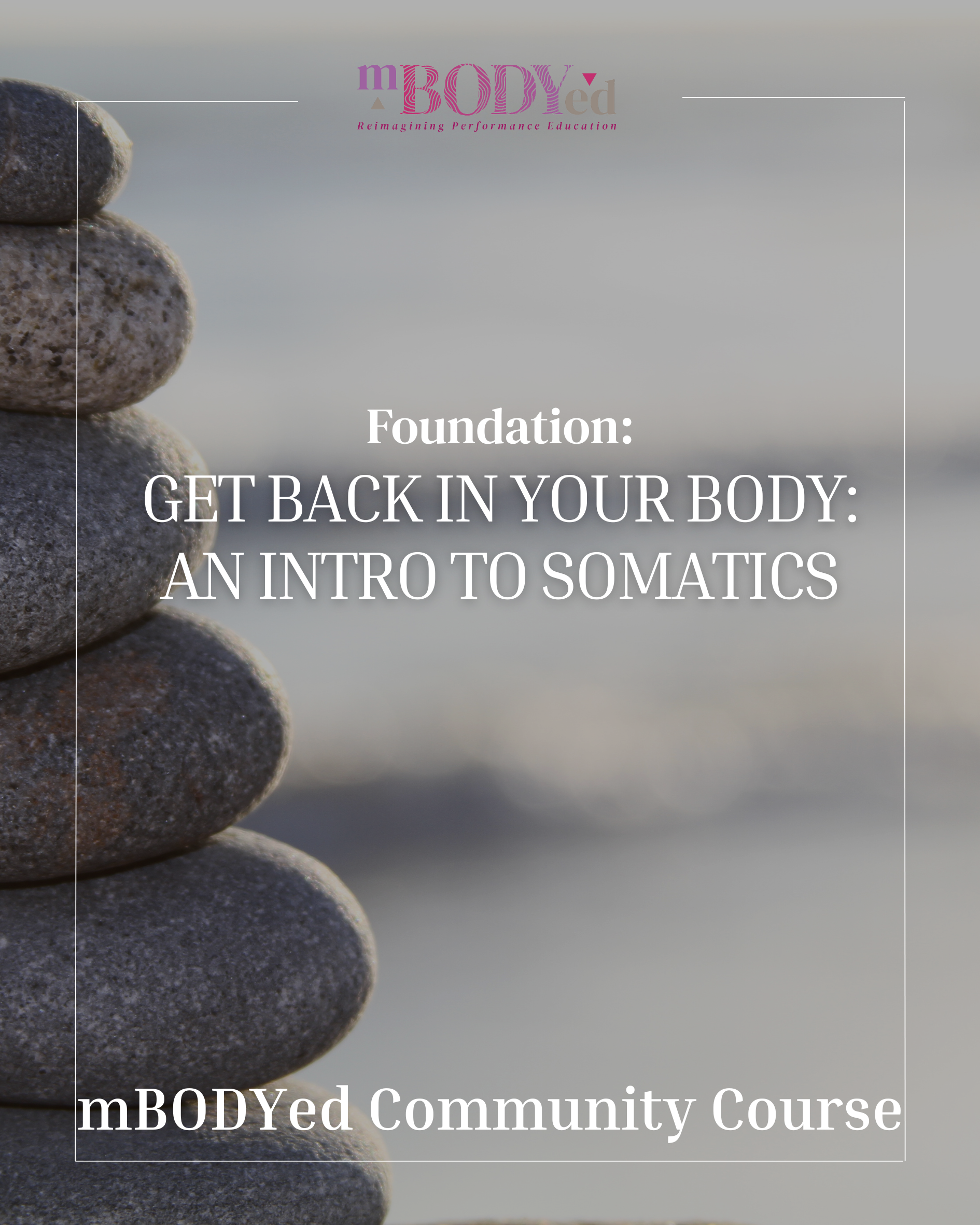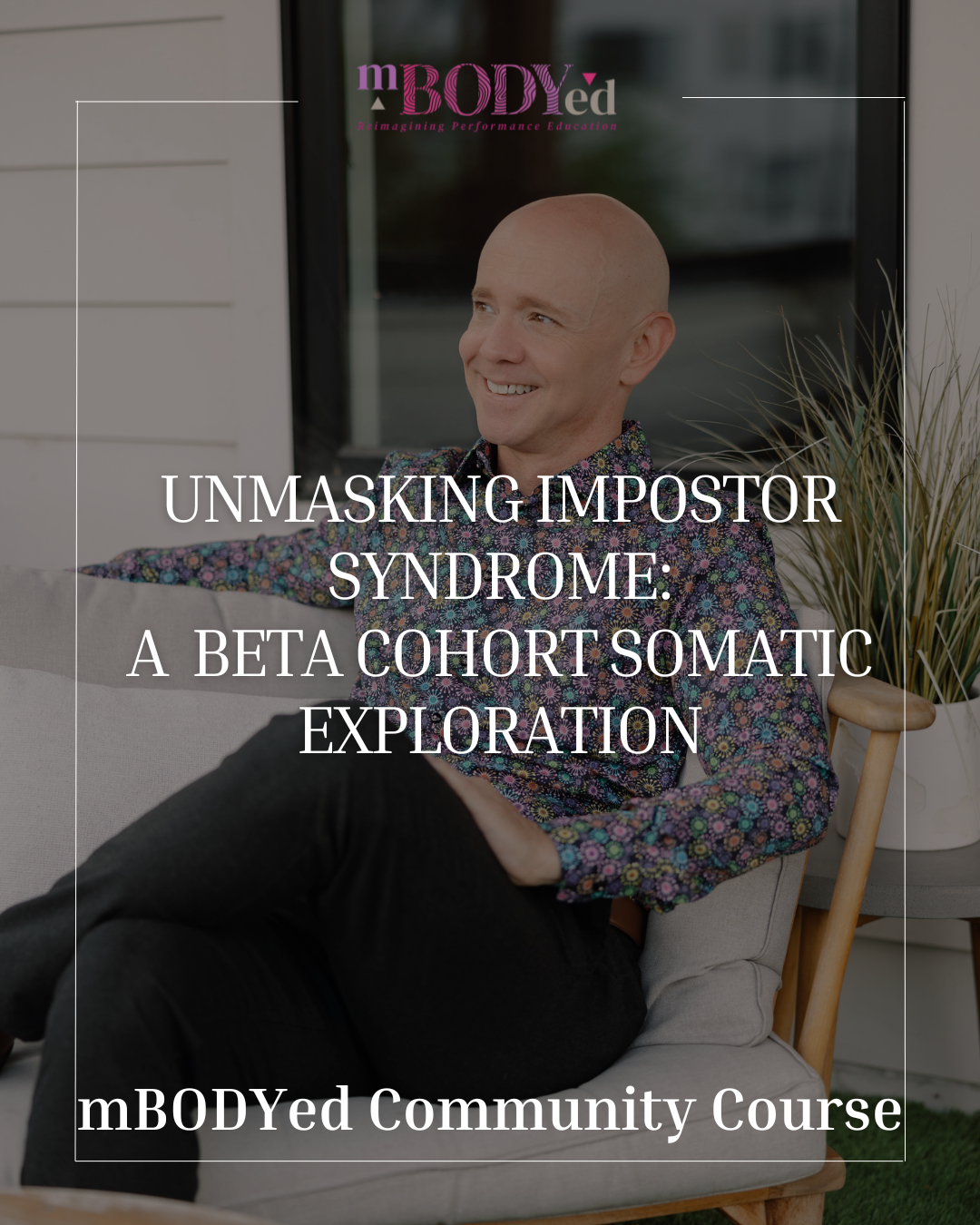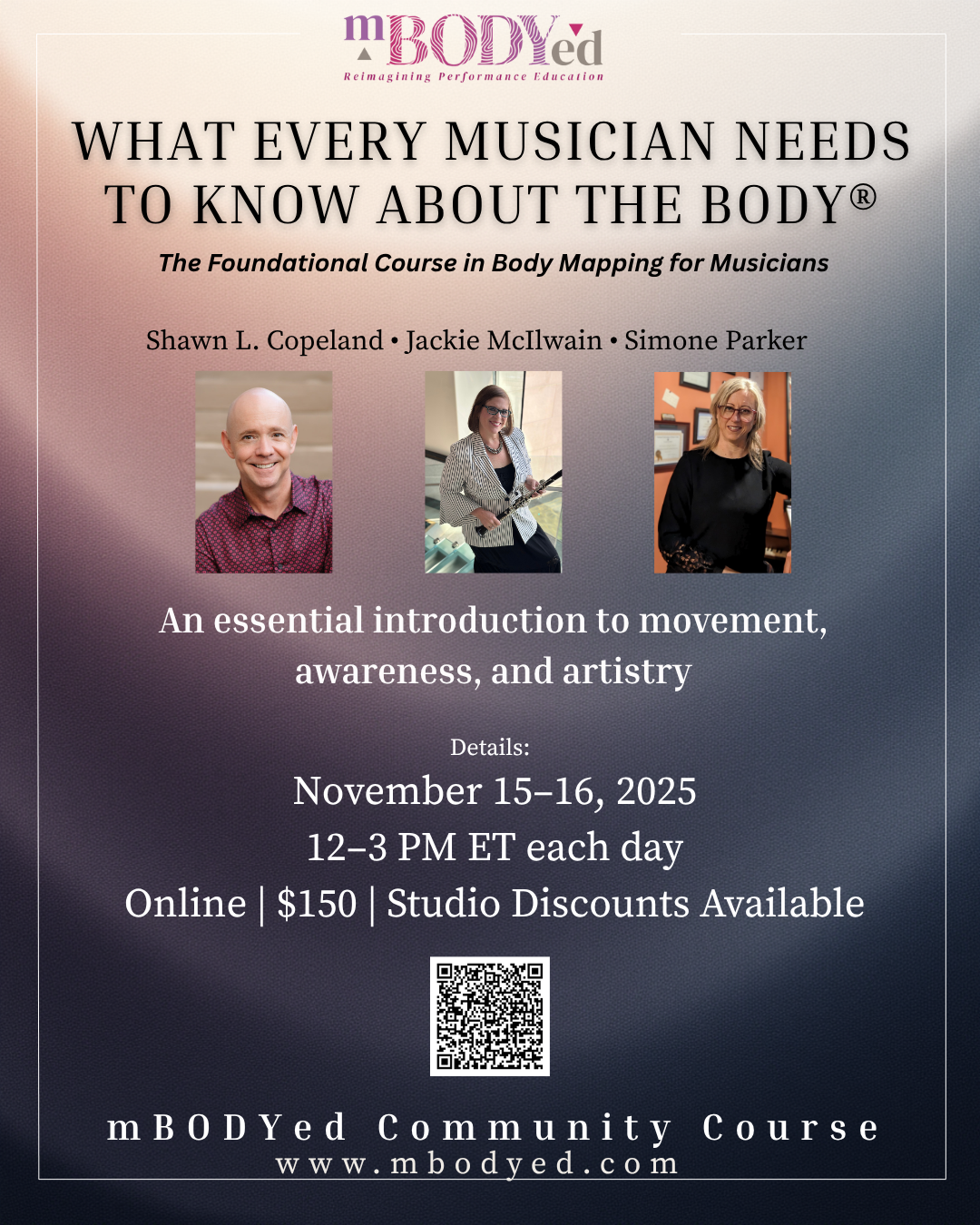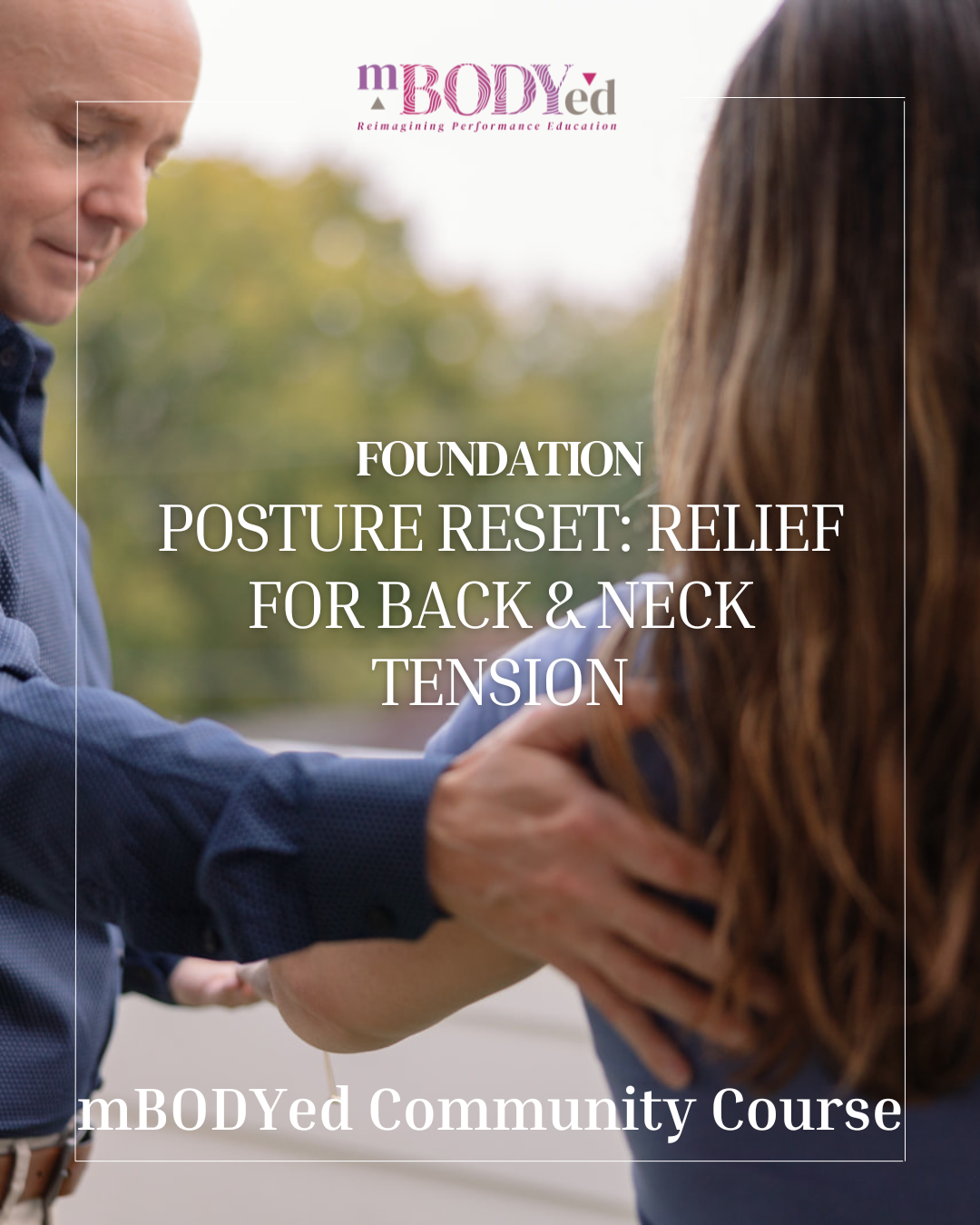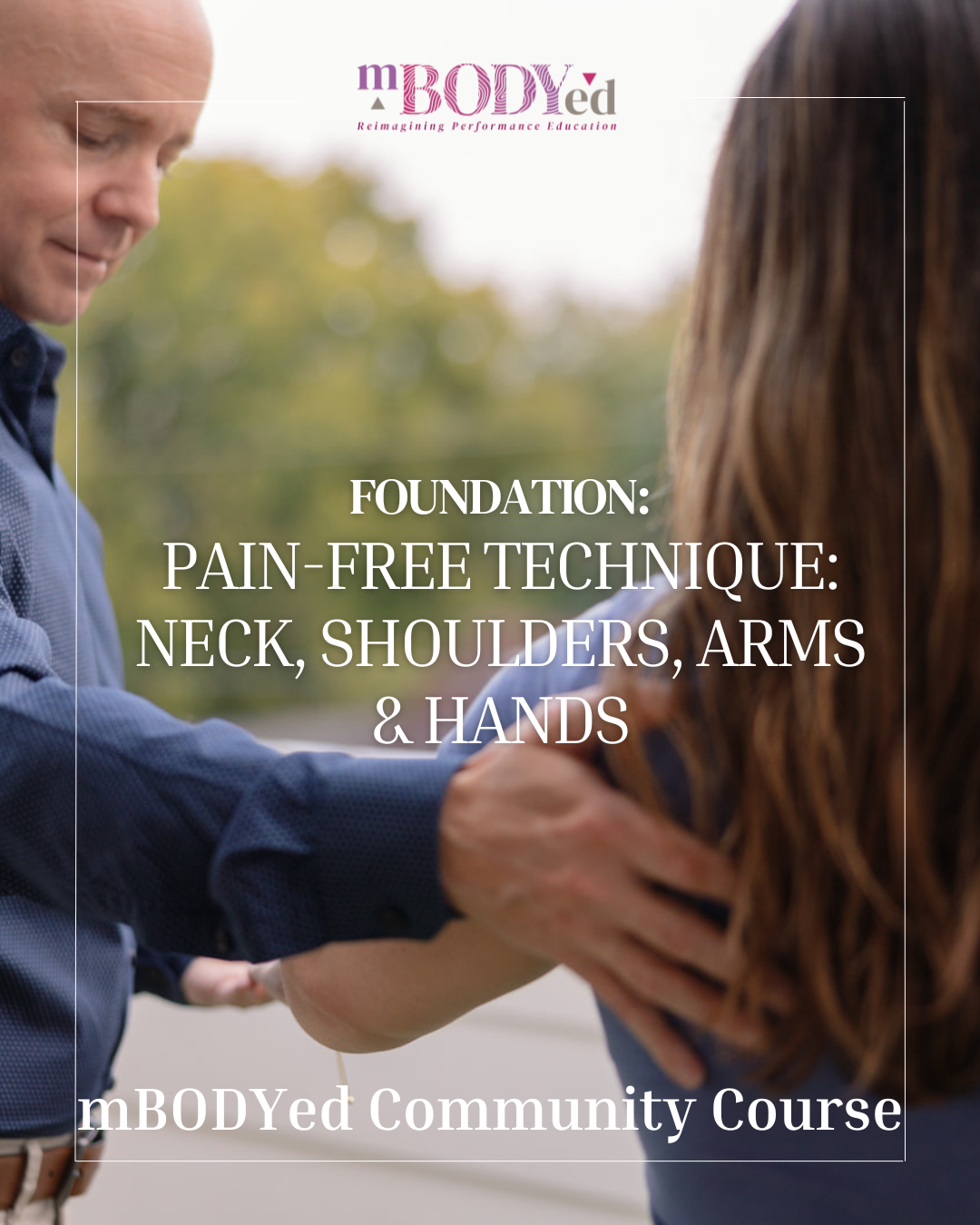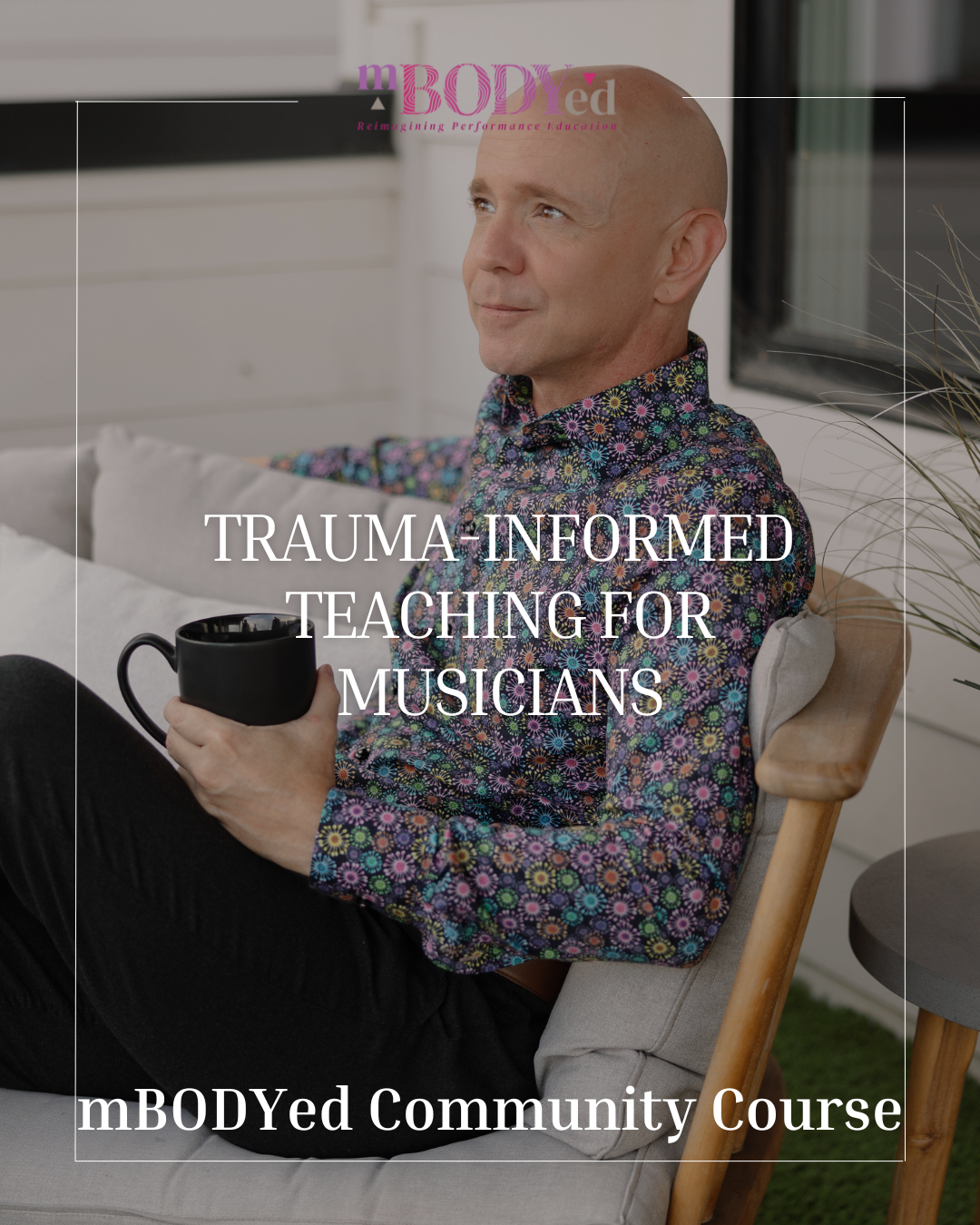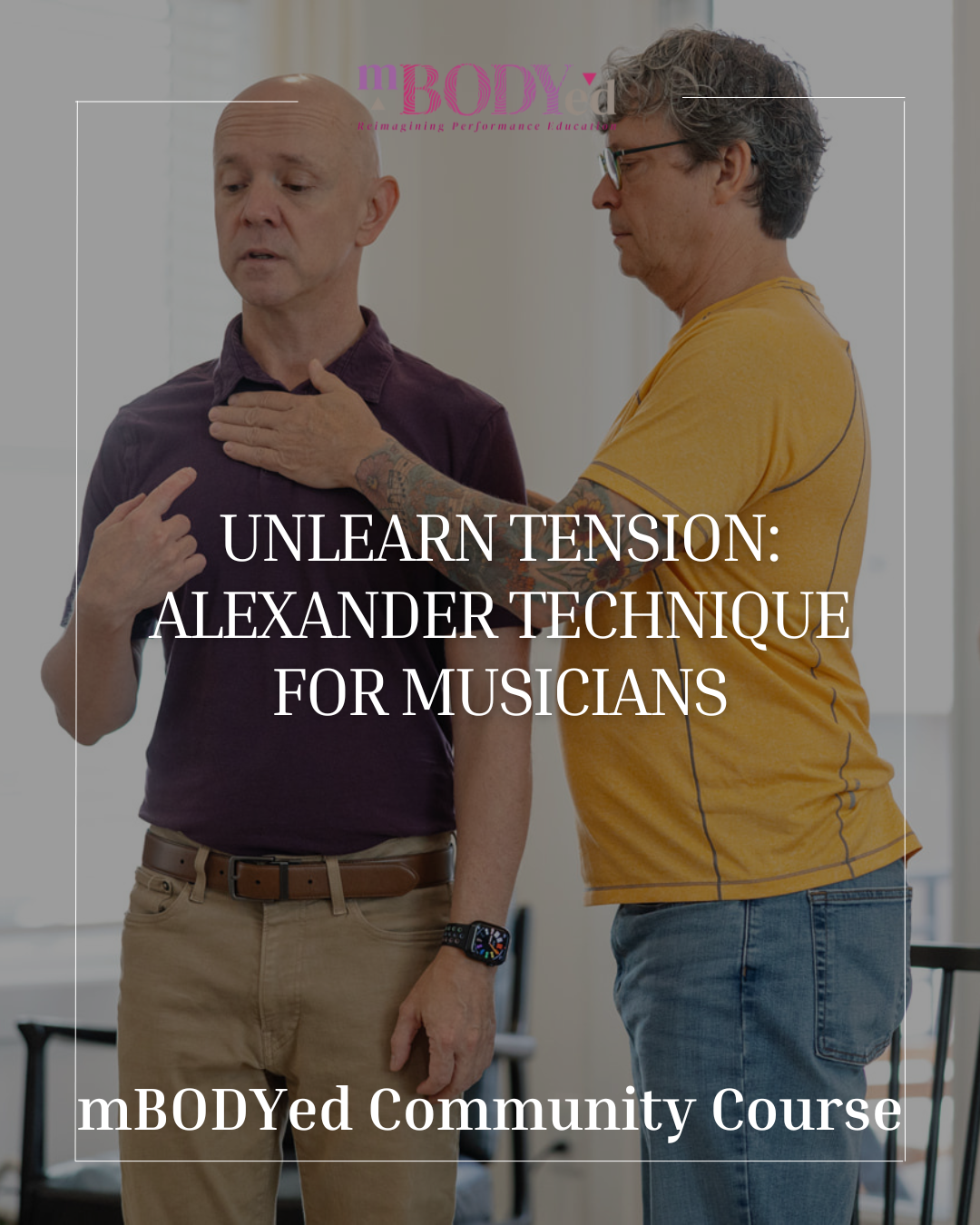Get Back in Your Body: An Intro to Somatics
A Gentle Introduction to Alexander Technique, Body Mapping, and Somatic Awareness. How your nervous system learns: small shifts, real change
Course Summary
Somatics is the art of listening to your body as a trustworthy guide. In this course, you’ll explore Alexander Technique, Body Mapping, and nervous-system-informed practices that help you replace over-efforting with coordinated ease. You’ll learn why habits form in the body, how state shapes attention and breath, and how to create change that sticks—gently and safely.
What You’ll Learn
A clear, working definition of Somatics, Alexander Technique, and Body Mapping
How “state” (fight/flight/freeze/fawn) shifts breath, posture, tone, and focus
Interoception + spatial awareness skills you can actually use
A kinder method for habit change: notice → pause → choose
Daily micro-practices for practice, performance, and teaching
Format & Includes
Self-paced modules with video, audio, guided practices, and printable prompts. Lifetime access.
Who It’s For
Musicians, educators, and helpers who want steadier energy, less tension, and more choice.
Schedule:
AVAILABLE NOW!
Unmasking Imposter Syndrome: A Somatic Beta Cohort
A 4-Session Community Space for Musicians, Educators, and Artists
You’re not a fraud. You’re not broken. And you’re not alone.
Imposter Syndrome isn’t just a thought pattern—it lives in the body. It shows up in your breath, your posture, your voice, and your ability to take up space.
This 4-session beta course is a community-centered exploration of Imposter Syndrome through a somatic lens. Together, we’ll create a safe and supportive space to slow down, share stories, ask questions, and explore how perfectionism, self-doubt, and fear of being “found out” live in the nervous system—and how we can begin to shift them.
What to Expect
A small group gathering (online) every other week
Gentle somatic practices rooted in Body Mapping, Alexander Technique, and nervous system regulation
Group reflection, facilitated discussion, and creative prompts
A nervous-system-friendly space with emphasis on consent, choice, and connection
No pressure to fix—just space to feel, notice, and support
Why Somatic Awareness?
Because Imposter Syndrome is not just a mindset—it’s a bodyset.
Through simple, supportive somatic tools, we can begin to interrupt patterns of collapse, shrinking, or over-performing and reconnect with an inner sense of stability, agency, and belonging.
Who This Is For
This beta cohort is for you if:
You’re a musician, artistic performer, or educator who feels like you’re secretly not good enough
You’re a recent graduate questioning your abilities and struggling to feel “legit”
You’re a somatic practitioner or coach-in-training wondering how to embody what you teach
You crave a community where you don’t have to hold it all together to be welcome
Course Details
Format: Live on Zoom
Schedule: 4 sessions, every other week
Dates: Course Starts January 26, 2026. Class Dates: Jan 26, Feb 9, 23, and March 9
Time: Mondays 7 PM - 8 PM ET/4 PM PT - 5 PM PT
Cost: BETA Pricing $40 Class only. Breakthrough Tier (2 Coaching Sessions): $280; Transformation (4 Coaching Sessions): $440
What Every Musician Needs to Know About the Body
Join mBODYed Faculty Shawn L. Copeland, Jackie McIlwain, and Simone Parker for a foundational introduction to Body Mapping for Musicians—the essential course that has helped thousands of musicians discover ease, freedom, and sustainable artistry.
Through a trauma-informed somatic lens, you’ll explore how accurate movement maps clarify the body’s design for support, balance, and expression.
You’ll learn practical skills to reduce tension, prevent injury, and play or sing with renewed vitality.
This course is ideal for musicians, educators, and students who want to deepen self-awareness and reclaim the joy of movement in performance.
Cost: $150.00
Tiered Pricing for those interested in deepening their learning with 1:1 Coaching:
Tiered Enrollment Options:
Foundation – Course Only
Integration – Course + 3 Coaching Sessions ($450 Value)
Transformation – Course + 6 Coaching Sessions ($900 Value)
Performance Anxiety: Nervous System Regulation for Musicians Under Pressure
Rewriting Habit Through Mapping + Nervous System Clarity
Course Summary
When stakes rise, the body does what it knows: speed up, shut down, or over-function. This course brings your patterns into view and offers kinder options. You’ll learn to recognize fight/flight/freeze/fawn, map how they live in breath and posture, and shift state without shaming yourself or fighting biology.
What You’ll Learn
Read your tells: breath lock, jaw/shoulder bracing, collapse
60-second tools to orient, downshift, and widen capacity
Breath options that reduce bracing (no chasing “big inhales”)
A repeatable pre-performance routine you’ll actually use
Format & Includes
6 live classes (recorded), guided audios, visual maps, reflection prompts.
Who It’s For
Musicians and educators who feel jitters, blanking, or “high-functioning” anxiety and want change that sticks—without forcing.
Course schedule:
Coming in January 2026!
Community Performance Class:
Fridays 3 PM ET/12 PM PT
Posture Reset: Relief for Back & Neck Tension
Reclaiming Ease Through Anatomical Awareness and Somatic Compassion
Course Summary
If “good posture” still hurts or collapses under pressure, the map needs an update. This class replaces bracing with coordinated support. You’ll clarify how the head balances on the spine, how ribs and pelvis actually move, and how to let breath participate—reducing strain while improving tone and stamina.
What You’ll Learn
Head–neck–spine coordination for posture that breathes
Six places of balance that organize whole-body ease
How mis-maps create tension (and how to change them)
Permission-based cues for lessons, rehearsals, and gigs
Format & Includes
6 live classes (recorded), diagrams, practice prompts, optional community class.
Who It’s For
Anyone finishing rehearsals with a tight neck or aching back—and teachers who want practical language beyond “stand up straight.”
Course schedule:
New Course Coming in 2026!
Community Performance Class:
Currently in progress! Stay tuned for future offerings
Pain-Free Technique: Neck, Shoulders, Arms & Hands
From Holding to Honesty in the Upper Limb
Course Summary
If “technique work” equals more effort and less ease, it’s time to re-map. Clarify how the sternum, clavicles, scapulae, and ribs coordinate the arms; how hands function without over-helping; and how breath and balance support speed and accuracy. Expect tiny experiments and immediate wins you can feel.
What You’ll Learn
Accurate shoulder-girdle mapping + functional arm spirals
Simple ways to stop recruiting jaw, neck, and low back
Micropauses and movement cues for practice sessions
Technique that supports expression—instead of fighting it
Format & Includes
6 live classes (recorded), PDF diagrams, quick-reference cards, optional performance lab.
Who It’s For
Performers and teachers with shoulder/neck holding, hand fatigue, or expressive “stuckness.”
Course schedule:
Course begins January 22, 2026. 6 Classes, no class Feb. 18
Community Performance Class:
Fridays 3 PM ET/12 PM PT (No class NOV 21, and Dec 5) Through May 15
Breath Support: Unlocking the Creative Breath
Reclaiming Support and Expression Through Somatic Breath Awareness
A 6-week online, synchronous course for wind musicians and singers ready to experience breathing as capacity—not control
Course Summary:
Your breath doesn’t need more force; it needs better coordination. This course clarifies how the diaphragm, ribs, and spine work together so breath can respond to musical intent. You’ll trade bracing for buoyant support, expand resonance, and sustain phrases with less effort.
What You’ll Learn:
Rib + spine coordination for responsive support
Throat/jaw freedom for color and resonance
How to stop over-blowing and still project
Sustainable practice strategies for endurance
Format & Includes
6 core classes (live + recorded), guided breath practices, printables, optional community class.
Who It’s For
Wind players and singers who feel breath is shallow, held, or forced—and teachers who want accurate, accessible tools.
Course schedule:
Thursdays, January 22, 29; February 5, 12, 26, March 5
Two options at 1 PM ET/10 AM PT and 7 PM ET/4 PM PT
Community Performance Class:
Fridays 3 PM ET/12 PM PT January 23 through the conclusion of the course
Trauma-Informed Teaching for Musicians
Reimagining Studio Pedagogy Through Somatics, Neuroscience, and Boundaries
This 6-week online course is designed for university and conservatory-level music faculty who are ready to integrate trauma-informed, somatic, and neuroscience-informed practices into their teaching.
Today’s students arrive with complex nervous systems shaped by stress, disconnection, and post-pandemic burnout. And today’s teachers are stretched thinner than ever—navigating full studios, performance demands, recruitment pressures, and their own internal strain. This course is a space to slow down, reconnect with your teaching values, and develop the skills that support sustainable, embodied, and relational studio environments.
Combining Body Mapping, Somatic Education, Nervous System Integration, Interpersonal Neurobiology (IPNB), and the relational tools of Brené Brown’s work on boundaries and trust, this course gives you both the science and the strategy to support your students—without losing yourself in the process.
Course Outcomes
By the end of this course, you will:
Understand the nervous system’s role in learning, performance, and relationship
Use somatic awareness to track and shift your internal teaching state
Set and uphold boundaries that protect your capacity and foster trust
Respond to student dysregulation with grounded, co-regulatory presence
Reimagine studio culture through a lens of safety, empathy, and integration
Who This Course Is For
This course is ideal for:
University and conservatory music professors (ages 35–65)
Applied studio faculty, ensemble directors, and department chairs
Educators seeking sustainable, relationship-centered pedagogy
Teachers feeling overwhelmed, over-responsible, or disconnected from their own teaching presence
You don’t need prior somatic training—just a willingness to show up with curiosity, reflection, and care.
Schedule & Format
Live online sessions: 90 minutes, once a week for 6 weeks
Dates: Begins March 30, 2026
Time: Two options on Mondays at 2 PM ET / 11 AM PT OR 6:30 PM ET / 3:30 PM PT
All sessions recorded with lifetime replay access
Weekly practices, journaling prompts, and studio tools to integrate as you go
Optional discussion forum and peer collaboration
What’s Included
6 Live Classes with lecture, discussion, and guided somatic practice
Audio practices (breath, state tracking, grounding)
Downloadable worksheets, journal prompts, checklists, and boundary templates
Peer feedback tools, trauma-informed lesson planning templates
Video library of somatic tools for studio use
Access to mBODYed's private course portal
Tuition & Commitment
mBODYed Tiered Pricing:
Foundational: $180
Breakthrough: $450
Transformation: $750
Payment plans available.
This course is not therapy and does not replace therapeutic support.
Unlearn Tension: Alexander Technique for Musicians
Discovering Ease, Presence, and Possibility Through the Alexander Technique. An online, synchronous course introducing the Alexander Technique as a path to sustainable freedom in movement, thought, and identity
Course Summary
Letting go isn’t collapse—it’s a choice. In this introduction, you’ll learn inhibition (the pause), direction (clear invitations to the whole self), and primary control (head–neck–spine coordination) in a contemporary, nervous-system-aware way. Reduce strain and widen presence without trying harder.
What You’ll Learn
The pause: interrupt tension before it starts
Gentle directions that reorganize the whole self
Translating AT into practice, performance, and teaching
A take-home routine for real artistic life
Format & Includes
6 core modules, audio practices, guided explorations, printable tools.
Who It’s For
Musicians and educators who over-effort, brace, or push—and want a kinder, more effective approach.
Course schedule:
Coming Soon!
Keep Unlearning Tension: Ongoing Alexander Technique Practice
Ongoing Practice. Ongoing Choice. Ongoing Change.
Course Summary
Sustainable change happens with steady practice. Continue sharpening pause/choice under pressure, deepening subtle direction work for balance, breath, and sound, and translating AT into your teaching. We’ll work slowly and specifically, with space for setbacks and real-world projects.
What You’ll Learn (over time)
Reliable pause/choice in rehearsal, studio, stage
Subtle direction work that travels with you
Teaching language, touch alternatives, consent
Integrating AT with injury, burnout, or touring
Format & Includes
Rolling live sessions with replays, seasonal themes, optional performance labs and coaching.
Who It’s For
Anyone with prior AT experience seeking sustained guidance and a supportive community.

